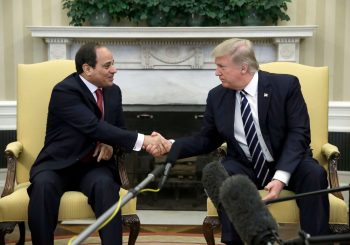Observers of the uprisings that engulfed the Arab world in 2011 praise Tunisia as the only Arab nation to fulfill its citizens’ desires for democracy. Yet certain obstacles remain – especially recent ones – which have clearly prevented this from becoming reality.
Tunisia did successfully install elections, allowing its people to choose who to represent them. On paper, this is indeed democracy. Taking further steps, the government has in recent months implemented progressive reforms that activists and human rights groups have long called for. These range from tightening laws on violence against women, abolishing a colonial-era ‘marry your rapist’ law, criminalizing sexual harassment, along with legalizing marriage between Muslim women and men of other faiths.
While these moves improve women’s status in society, certain issues still prevent Tunisia from evolving into the democracy many of its citizens desire. In fact, many observers suspect legalizing inter-faith marriages was actually a ploy to divert attention away from corrupt government policies, including a law passed the following day granting amnesty to former officials involved in corruption during the rule of former autocrat Zine al Abadine Ben Ali, whose government Tunisians fought to overthrow. To no one’s surprise, many Tunisians today feel betrayed.
Yet these ministers are not the only aspect of Ben Ali’s era to return. Authoritarianism has as well. Much like Egypt, Tunisians’ efforts to abolish an autocratic regime have been nullified.
This comes in spite of Tunisia’s pledges at the UN Human Rights Council to adopt nearly 200 reforms recommended by the council. While some look at this optimistically, it begs the question if the government will genuinely live up to its promises.
One widespread problem the council addressed is the pressing issue of violence from authorities.
In a later address to the UN General Assembly, along with discussing regional issues such as Libya and Palestine, Tunisian foreign minister Khemais Jhinaoui stated that security and military expenditure in Tunisia will double to facilitate counter-terrorism measures.
While no one doubts the importance of countering terrorism, this may further empower Tunisia’s security forces, who have committed countless human rights violations even after the revolution, and act as a pillar of authoritarianism that prevents Tunisia from achieving full democracy.
This is one key institution that was not reformed after the revolution, preventing democracy from being realised.
As is arguably also the case in Egypt, the government uses the threat of terrorism to abuse its power. After all, Tunisia has enforced a state of emergency since 2011. While supposedly a national security measure, the police have used their increased power to carry out abuses on civilians. This ranges from torture and sexual assaults to arbitrary home raids and arrests. In a report titled ’We want an end to the fear‘: Abuses under Tunisia’s State of Emergency. Amnesty International highlights how authorities have used this state of emergency to abuse its power.
With regards to torture, most claims are dismissed by the government. Few are followed up. Even less lead to prosecution. The security forces clearly enjoy an incredible amount of impunity when trampling on individual rights.
Violence against protestors has often occurred as well, both during Ben Ali’s rule and under the new government. Take the shocking episode in the economically-deprived southern city of Tataouine this year, when crowds gathered to protest mass unemployment and low wages. One was killed; several others were injured or detained.
The public’s concerns about their livelihoods were dismissed, and force was instead used. These are not the practices of a democratic government, but an authoritarian one.
Even more worryingly, along with giving security forces increased funding, Tunisia has proposed a bill that would grant the security forces greater impunity when using lethal force on civilians.
“This bill is a dangerous step towards institutionalizing impunity in Tunisia’s security sector”, said Heba Morayef, North African research director at Amnesty International.
Tunisia’s pledges for reforms and decreased violence from security forces would be meaningless if this bill is passed. It would give a green light to security forces to further abuse their power.
Journalists having been detained for criticizing the army and police, which operate as a totalitarian force within the country, highlights that free speech is restricted.
People were arrested for eating and drinking during Ramadan this year – despite no law restricting this act – indicates that the police act lawlessly to enforce their own agenda.
It seems that while the country is taking one step forward on gender equality, it has taken two steps back when it comes to the use of violence against civilians.
Many were hopeful that authoritarianism would fade after Tunisia in September outlawed forced anal examinations on suspected homosexuals. Critics have decried this policy itself as torture. Yet the act has still carried on after Tunisia adopted recommendations to change it, dashing positive expectations of this move.
Such realities pose threats to Tunisia’s title of ‘the model Arab nation’. This will dash their recent claims to address human rights abuses within the country.
Tunisia can indeed succeed as a democracy, which much of its population desires. Yet, this can only be achieved by curtailing the power of the security forces. If granted further impunity and more power, human rights violations will continue, and Tunisia will be dragged back towards authoritarianism.







Comments (0)